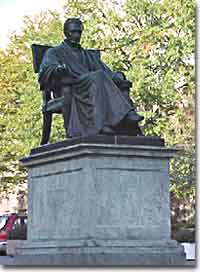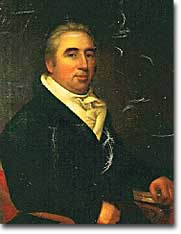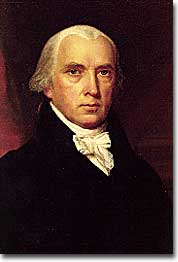9a. The Creation of the Federal Courts

John Marshall was chief justice of the United States from 1801 to 1835. His decisions defined constitutional law and judicial precedent.
The Constitution painstakingly defines the structure and functions of the legislative (Congressional) branch of the government. It clearly (although less thoroughly) addresses the responsibilities and powers of the president.
But, it treats the judicial branch almost as an afterthought. Article III specifically creates only one court (the Supreme Court), allows judges to serve for life and to receive compensation, broadly outlines original and appellate jurisdiction, and outlines the trial procedure for and limitations of congressional power against those accused of treason.
That's all.
Marshall Marshals the Court

William Marbury's lawsuit gave Marshall the opportunity to institute the power of judicial review.
The framers of the Constitution were clearly more interested in their experiment with legislative government than in the creation of a judicial system. Had it not been for John Marshall, the third chief justice of the Supreme Court, the judicial branch might well have developed into a weak, ineffective check on the legislature and the presidency.
But Marshall changed everything by interpreting a power "implied" by Article III. Judicial review, or the power of the courts to overturn a law, was the vehicle he used to create the most powerful judicial branch in the history of the world.
Article III of the Constitution
Section 1. The judicial Power of the United States, shall be vested in one supreme Court, and in such inferior Courts as the Congress may from time to time ordain and establish. The Judges, both of the supreme and inferior Courts, shall hold their Officer during good Behaviour, and shall at stated Times, receive for their Services, a Compensation, which shall not be diminished during their Continuance in Office.

As secretary of state, James Madison refused to deliver the commissions of a number of "midnight judges," judges who had been appointed by John Adams in the last days of his term.
Section 2. The judicial Power shall extend to all Cases, in Law and Equity, arising under this Constitution, the Laws of the United States, and Treaties made, or which shall be made, under their Authority, — to all Cases affecting Ambassadors, other public Ministers and Consuls; — to all Cases of admiralty and maritime Jurisdiction, — to Controversies to which the United States shall be a Party; — to Controversies between two or more States, — [between a State and Citizens of another State;](1) between Citizens of different States, — between Citizens of the same State claiming Lands under Grants of different States, [and between a State or the Citizens thereof, and foreign States, Citizens or Subjects.] (2)
In all Cases affecting Ambassadors, other public Ministers and Consuls, and those in which a State shall be Party, the supreme Court shall have original Jurisdiction. In all the other Cases before mentioned, the supreme Court shall have appellate Jurisdiction, both as to Law and Fact, with such Exceptions, and under such Regulations as the Congress shall make.
The Trial of all Crimes, except in Cases of Impeachment; shall be by Jury, and such Trial shall be held in the State where the said Crimes shall have been committed but when not committed within any State, the Trial shall be at such Place or Places as the Congress may by Law have directed.
Section 3.Treason against the United States, shall consist only in levying War against them, or in adhering to their Enemies, giving them Aid and Comfort. No Person shall be convicted of Treason unless on the Testimony of two Witnesses to the same overt Act, or on Confession in open Court. The Congress shall have Power to declare the Punishment of Treason, but no Attainder of Treason shall work Corruption of Blood, or Forfeiture except during the Life of the Person attainted.
(1&2) Changed by the Eleventh Amendment.
Marbury v. Madison (1803)
The power of judicial review may be traced to the famous 1803 court case of Marbury v. Madison. The election of 1800 gave that the presidency to an opposing political party for the first time. Fearing that the newly elected Thomas Jefferson, a Democratic Republican, would undo his policies, Federalist president John Adams, sought to "pack" the courts with Federalist judges. He worked feverishly on the judicial appointments until the very end of his presidency. When he left office, several of the orders were left on the secretary of state's desk, waiting to be delivered.
The new secretary of state, James Madison, saw what Adams was up to, and refused to carry out the commissions. William Marbury, a Federalist whose commission was not delivered, sued Madison and demanded that the Supreme Court force Madison to act. Marbury's demand was based on the writ of mandamus, a power given to the Court by the Judiciary Act of 1789 to command actions by officials of the executive branch.
Chief Justice Marshall faced a huge dilemma. What if he commanded Madison to deliver the commissions and the secretary of state ignored his command? What could Marshall do to enforce the decision? The Court had no army, nor any other means to back up the command. If Marshall did nothing, the quarrel could spill over to Congress and tear the new country apart before it even got off the ground.
The Writ StuffMore Information ...
A writ is a written court order requiring a party to perform or cease to perform a given act.
Marshall's decision was to declare the writ of mandamus unconstitutional, claiming that Congress had passed a law "repugnant to the Constitution." He declared that because Article III did not grant the judicial branch the power of the writ of mandamus, and so the Supreme Court was unable to order Madison to act. Of course, Jefferson and Madison were happy with the decision, and the crisis passed, with only a disgruntled prospective justice (Marbury) to protest.
|
The constitution is either a superior paramount law, unchangeable by ordinary means, or it is on a level with ordinary legislative acts, and, like other acts, is alterable when the legislature shall please to alter it.... Certainly all those who have framed written constitutions contemplate them as forming the fundamental and paramount law of the nation, and, consequently, the theory of every such government must be, that an act of the legislature, repugnant to the constitution, is void.... It is emphatically the province and duty of the judicial department to say what the law is. Those who apply the rule to particular cases, must of necessity expound and interpret that rule. If two laws conflict with each other the courts must decide on the operation of each. So if a law be in opposition to the constitution: if both the law and the constitution apply to a particular case, so that the court must either decide that case conformably to the law, disregarding the constitution; or conformably to the constitution, disregarding the law: the court must determine which of these conflicting rules governs the case. This is of the very essence of judicial duty. | ||
The Supreme Court Gets the Final Word
No one seemed to understand the grand implications of what Marshall had done: he had created the power of judicial review. This established the precedent that only the federal courts could interpret the Constitution. This power has given federal judges the final word in settling virtually every major issue that has challenged the government in American history.
Today, the judicial branch not only provides strong checks and balances to the executive and legislative branches, it possesses a tremendous amount of policy-making power in its own right. This power rests more on the precedent (a principle that later justices followed) of judicial review set by Marshall in 1803 than on the provisions of the Constitution.







